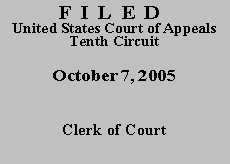

| SHERILYN JO GALLEGOS,
Petitioner-Appellant, v. COMMISSIONER OF INTERNAL REVENUE, Respondent-Appellee.
GEORGE GALLEGOS, III, Petitioner-Appellant, v. COMMISSIONER OF INTERNAL REVENUE, Respondent-Appellee.
RICHARD DEAN RUDD, JR., Petitioner-Appellant, v. COMMISSIONER OF INTERNAL REVENUE,
Respondent-Appellee.
|
No. 04-9012 No. 04-9013 |
In January 2004, respondent issued notices of income tax deficiencies to petitioners for the taxable years 1999, 2000, and 2001. Respondent asserted that the deficiencies arose because petitioners had failed to report wages and income derived from a subchapter S corporation. In October 2004, petitioners filed petitions for a redetermination of the deficiencies in the United States Tax Court. In November 2004, the Tax Court dismissed the petitions, concluding that petitioners had failed to state a claim upon which relief could be granted. Specifically, the Tax Court concluded as follows:
[Tax Court] Rule 34(b)(4) requires that a petition filed in this Court contain clear and concise assignments of each and every error that the taxpayer alleges to have been committed by the Commissioner in the determination of the deficiencies and the additions to tax in dispute. Rule 34(b)(5) further requires that the petition contain clear and concise lettered statements of the facts on which the taxpayer bases the assignments of error. See Jarvis v. Commissioner, 78 T.C. 646, 658 (1982).
The petition[s] filed in this case [do] not satisfy the requirements of Rule 34(b)(4) and (5). There is neither assignment of error nor allegation of fact in support of any justiciable claim. Rather, the petition[s] contain[] nothing but frivolous and groundless arguments.
Tax Court Records for Case Nos. 7204-04, 7205-04, and 7210-04, Doc. 9 at 2.
Petitioners have filed timely appeals in this court challenging the Tax Court's dismissal orders, and the appeals have been consolidated for procedural purposes. We have jurisdiction over the consolidated appeals under 26 U.S.C.
§ 7482(a)(1), and "[w]e review de novo the Tax Court's dismissals for failure to state a claim." Fox v. Comm'r, 969 F.2d 951, 952 (10th Cir. 1992). In addition, because petitioners are proceeding pro se, we review their pleadings liberally. See Haines v. Kerner, 404 U.S. 519, 520 (1972). Having conducted the required de novo review, we agree with the Tax Court that, even construed liberally, the petitions at issue in this appeal contain nothing but frivolous and groundless arguments. Accordingly, we affirm the Tax Court's dismissal of the petitions. For the reasons set forth herein, we also conclude that these appeals are frivolous.
As a starting point, we reject petitioners' claim that the Internal Revenue Service lacked jurisdiction and authority to issue the deficiency notices. Despite petitioners' claim to the contrary, the federal government's taxation power is not limited to the District of Columbia or other federal enclaves. See United States v. Collins, 920 F.2d 619, 629 (10th Cir. 1990) ("For seventy-five years, the Supreme Court has recognized that the sixteenth amendment authorizes a direct nonapportioned [income] tax upon United States citizens throughout the nation, not just in federal enclaves, . . .; efforts to argue otherwise have been sanctioned as frivolous.") (citations omitted).
Petitioners are also mistaken when they argue that they must have a "nexus" with the federal government in the form of a contract or other beneficial relationship before they can be compelled to pay federal income taxes. See United States v. Sloan, 939 F.2d 499, 501 (7th Cir. 1991) ("All individuals, natural or unnatural, must pay federal income tax on their wages, regardless of whether they requested, obtained or exercised any privilege from the federal government.") (quotation omitted). Likewise, petitioners' argument that the "Federal Government cannot act upon sovereign people, only upon the states," Aplts. Opening Br. at 20, is patently wrong if petitioners mean that the federal government does not have the power to tax individual citizens. All citizens of the United States are liable for income taxes, and every person born in the United States is a citizen of the United States. 26 C.F.R. § 1.1-1(a), (b), and (c);
cf. Lonsdale v. United States, 919 F.2d 1440, 1448 (10th Cir. 1990) (rejecting argument that individual who is a citizen of a state is not a person under the Internal Revenue Code as "completely lacking in legal merit and patently frivolous").
We also reject petitioners' claim that the "Internal Revenue Manual Reveals Secret Default Process Used by Commissioner's Delegates." Aplts. Opening Br. at 10 (emphasis omitted). Simply put, none of the administrative or Tax Court proceedings in this matter can be characterized as involving a "secret default."
Finally, there is no merit to petitioners' claim that they "exercised [their] right to equal treatment under the law by performing the same administrative default process upon the IRS that the IRS uses upon the people." Id. at 15. As with their other frivolous arguments, petitioners have failed to put forth any relevant legal authority to support their claim that respondent "defaulted" during the administrative proceedings in this case.
The Tax Court's dismissal orders are AFFIRMED. We also DENY each and every request for relief that petitioners have made in their appellate briefs and any other filings submitted to this court.
Entered for the Court
Circuit Judge
*. This order and judgment is not binding precedent, except under the doctrines of law of the case, res judicata, and collateral estoppel. The court generally disfavors the citation of orders and judgments; nevertheless, an order and judgment may be cited under the terms and conditions of 10th Cir. R. 36.3.